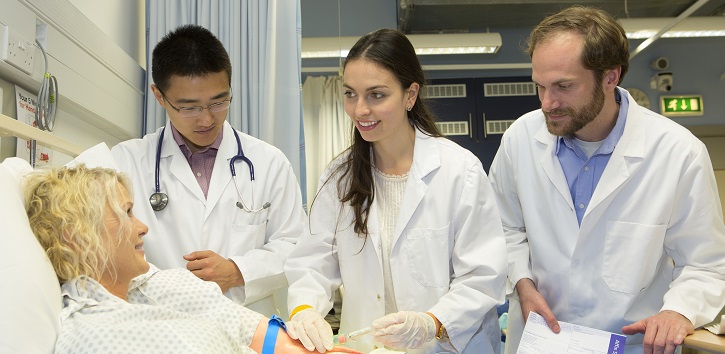In This Section
Curriculum

Curriculum
The medical curriculum at UCC is an integrated, systems-based curriculum. From the very beginning, medical students learn clinical skills and professionalism alongside basic medical sciences so that knowledge is acquired in an integrated, patient-centred and holistic way. The programme is divided into four integrated ‘streams’ - teaching occurs across all years and is related to other teaching in that semester. The four streams are: Biomedical Science; Clinical Science and Practice; Person, Culture and Societ;, and Research and Student-Selected Components.
The curriculum is further enhanced by a wide range of elective modules ranging from library projects to the Humanities. Research is a key element of UCC medical education, and all students have structured teaching in research methodologies and complete a research project in the final two years of the programme.
Stream 1: Biomedical Science
These are the fundamentals of medical science modules (FM modules) and comprise systems based integrated modules in anatomy, biochemistry, microbiology, pathology, pharmacology and physiology. Students review the structure and function of the major systems at whole body, organ tissue cellular and sub-cellular levels exploring normal structure and function before developing an understanding of mechanisms and manifestations of disease.
Stream 2: Clinical Science and Practice
The early focus is on history taking and examination skills. Students learn how to examine each system in detail and are taught common clinical signs and clinical procedures. Students also learn communication skills. Initially, teaching is in the clinical skills labs using our experienced ‘role players’. Teaching then changes to the clinical environment and students spend most of their time in hospitals and Family Practices.
Stream 3: Person, Culture and Society
Stream 3 widens the lens through which patients and patient care is understood. In this stream, students explore biopsychosocial issues, public health and epidemiology, professionalism and communication and consultation skills.
Stream 3 has six key domains which map directly to curriculum learning outcomes and integrate with the other streams.
- Mind-body interactions in health and disease: Biopsychosocial aspects of health and illness, functional problems, health related anxiety, stress and distress
- Patient behaviour: Psychological and social aspects of illness, patient centred care
- Doctor role and behaviour: Professionalism, Management including self management, leadership
- Doctor – patient interactions and communications: Communication skills
- Social, cultural and ethical issues in healthcare: Social & cultural diversity, social determinants of health, medical ethics and legal medicine
- Health policy, informatics and economics: Health services, Epidemiology, Public Health, clinical decision making, global health
Stream 4: Research and Student Selected Module
The purpose of Student Selected Modules (SSMs) is to extend the depth of study, support evidence-based medicine (EBM), enhance professionalism and personal skills, and encourage effective communication. During years 1-3, students select one student-selected module (SSM) each year. Research is top of the agenda at UCC and all medical students receive early teaching in research methodology and complete a Final Year research project.
Student-Selected Modules
Student Selected Components support the core curriculum and allow students to:
- Learn about and begin to use research skills
- Have greater control over their own learning and develop self directed skills
- Study topics of particular interest outside the core curriculum
- Develop greater confidence in their own skills and abilities
- Present the results of their work verbally, visually or in written format
- Consider potential career paths through experience in different clinical environments
School of Medicine
Scoil an Leighis
Contact us
Room 2.59, Brookfield Health Science Complex, College Road, Cork, T12 AK54,
